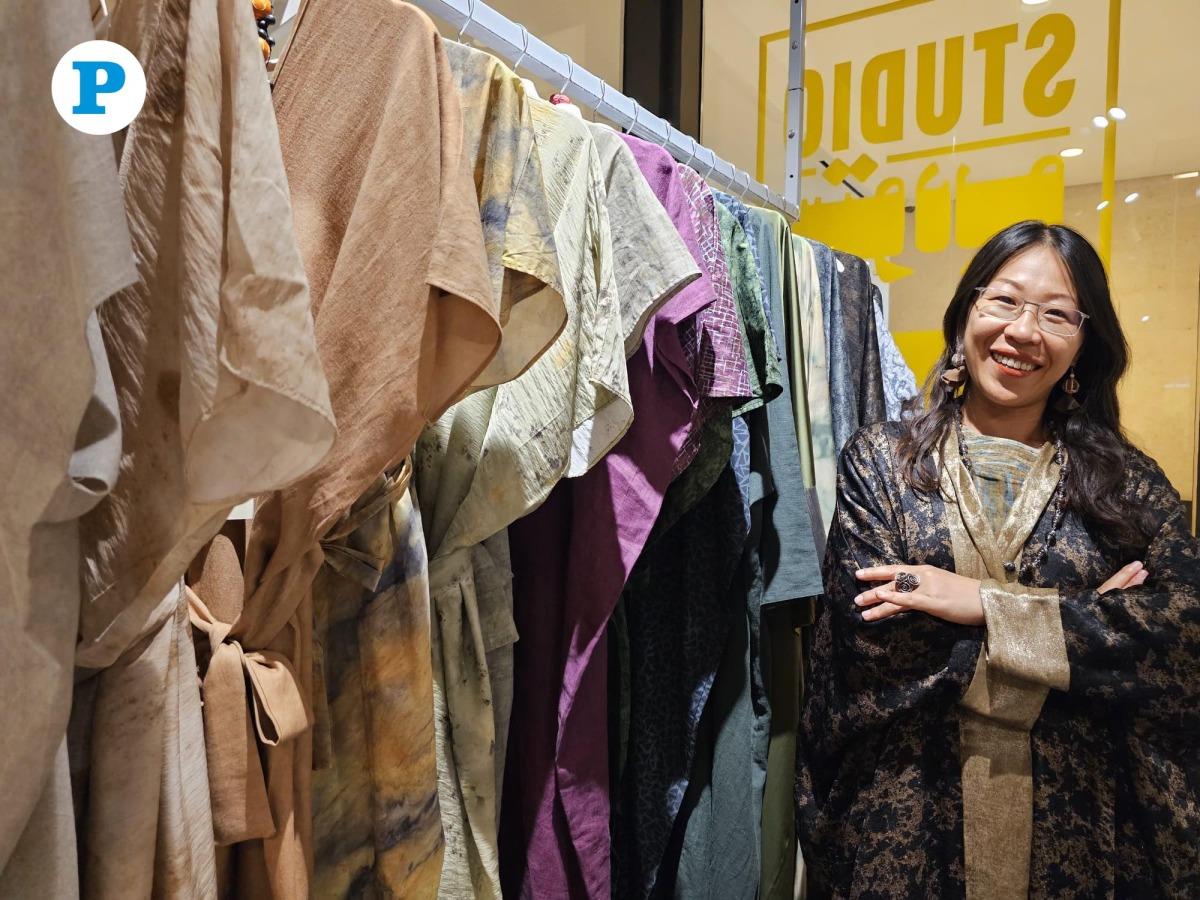
Doha-Based Chinese Designer Weaves A 'Unique', Sustainable Future
Doha, Qatar: For Chinese designer Michelle Wu, it's okay to be different. It's a belief that has guided her through a quiet, transformative journey from a fast-paced corporate life in Beijing to the calm, creative rhythm she has found in Doha.
“Being unique is about honouring individuality and staying true to yourself. That's what my work is about,” she told The Peninsula, gently arranging pieces from her summer and winter collections inside Studio 7 at M7.
That outlook became the foundation for her fashion label,“Unique,” a name that captures her approach to design and to life. Every piece she creates carries that same spirit: limited-edition garments, often just one or two per design, made using hand-dyed, artisan textiles sourced from China and Indonesia. Her designs combine traditional craftsmanship with contemporary silhouettes and clean, modern lines in what she calls“a gentle rebellion against fast fashion.”
Before moving to Qatar, Wu worked for eight years as an Administrative Manager in Beijing. But when her husband received a job offer in Doha, the couple embraced the change, even though it meant stepping away from her career.
“The transition was emotionally challenging. I became a full-time homemaker, which was a big change. But in that stillness, I began to reconnect with myself and rediscover what made me feel alive.”
Michelle Wu during batik hand painting and natural dyeing of textile in Bali, Indonesia.
That reconnection sparked during a 2023 trip to Bali. While taking a batik class and touring local textile markets, something clicked. She bought three metres of hand-printed fabric and followed her instincts.“It felt like a door opened,” she recalled.“What began as therapy turned into a calling.”
"I work closely with artisans in China and Indonesia, building relationships grounded in mutual respect and fair trade. Their craftsmanship is extraordinary, and I'm committed to honouring it through ethical sourcing, transparent collaboration, and designs that celebrate their cultural heritage," she told The Peninsula.
Inspired by craftsmanship, love of culture and conscious living, Wu began building her brand around sustainability. Every piece starts with fabric, often handwoven by women artisans using age-old methods. The design comes next, guided by the texture and spirit of the cloth. The result is timeless, meaningful fashion that tells a story.
Michelle Wu at a backstrap weaving place in South China.
"The fabric guides the design: its patterns, shapes, and story inform the silhouette. Once inspired, I sketch the concept and collaborate with a tailor to bring it to life."
Creating each item is slow, intentional work.“Natural dyeing depends on the weather. If it rains, you wait. Each piece is different,” she explained.“It teaches you patience and respect.”
"Traditional weaving is a sacred craft. From naturally dyeing the yarn to designing patterns and handloom weaving, it can take five to six days just to produce a small piece of fabric. Experiencing this process firsthand deepened my respect for the artisans and reaffirmed my commitment to slow fashion."
In Qatar, where traditional attire like the abaya holds deep cultural meaning, Wu found a new way to express her design voice. Her abayas, made from breathable cottons and linens, honour heritage while offering a fresh, sustainable twist. During festive seasons, she designs one-of-a-kind versions which are playful, bold, and deeply personal.
Though she doesn't directly incorporate Qatari sadu weaving in her designs, Wu finds deep inspiration in how textile traditions connect women across cultures.“Wherever you go, you'll find women weaving, using their hands to tell stories. There's something really universal about that.”
Michelle Wu's natural dye, handwoven winter collection at Heenat Salma and handpainted batik summer collection at Torba Farm.
Doha's creative community has also played a big role in Wu's journey. In 2019, she launched her brand at Torba Market, which she describes as the first space where her ideas met a real audience.
"Torba was where it all started. It gave me space to share my work, talk to people, and grow the brand organically. Heenat Salma and Studio 7 allowed local and independent designers like me to showcase our work, connect directly with the community, and grow from concept to brand," she told The Peninsula.
“I'm so grateful for these spaces, as they don't just support designers, but they cultivate creativity, collaboration, and culture," she said.
Handmade silver ring and freshwater pearl brooch.
Looking ahead, Wu plans to expand her collections through collaborations and continue producing small-batch designs. She's also working on a new line of handcrafted jewellery made from natural materials, designed to complement her garments and reflect the same values of slow fashion.
As her brand grows, she hopes it also serves as quiet encouragement for others finding their way. Wu aims to inspire, especially women navigating change, to trust their own journey.
“Be kind to yourself. Listen to your gut. When something feels right, follow it and don't stop just because it's slow. Passion and effort? People feel it.”

Legal Disclaimer:
MENAFN provides the
information “as is” without warranty of any kind. We do not accept
any responsibility or liability for the accuracy, content, images,
videos, licenses, completeness, legality, or reliability of the information
contained in this article. If you have any complaints or copyright
issues related to this article, kindly contact the provider above.


















Comments
No comment